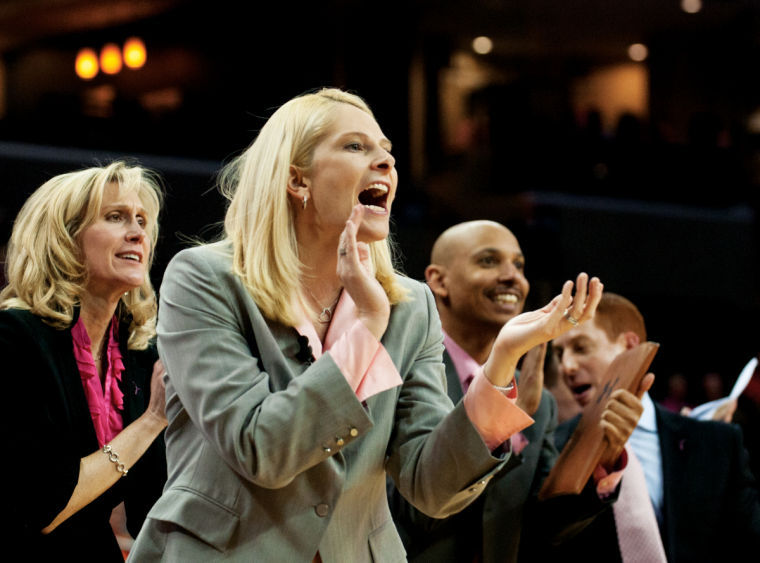
Terps coach Brenda Frese.
When the Terrapins women’s basketball team takes the court at Comcast Center for a late-season practice, it knows its time is limited — literally.
Instead of grinding through more than two-hour practices like they have in the past, the Terps practice for 75 minutes. And not a minute more.
This Terps team, beset by injuries all season, has presented a unique challenge for coach Brenda Frese and her assistants. With just eight healthy players — and only seven during a brief stretch — for much of the season, the staff knew things had to change when it came to the No. 10 Terps’ practice regimen.
The most logical adjustment came with shortened practices. After losing center Essence Townsend and guards Brene Moseley and Laurin Mincy to torn ACLs, the Terps didn’t have enough bodies to form two full squads, even after former Terps volleyball player Caitlin Adams joined the squad in January.
So to keep players who were playing more than 28 minutes per game — the team has four of them — sharp for contests, Frese modified the length and structure of her practices.
“It was uncharted territory for us,” Frese said. “I think the one thing we found with the limited practice time is now our players are fresh. They have legs.”
Despite putting together a practice squad made up of university students with basketball backgrounds to simulate in-game situations, the Terps run the court less in practice, forward Tianna Hawkins said. Instead, most of the work happens in the half court, focusing on the minute details of the offense or defense.
In past practices, Frese would try to work every single facet of a game plan into practices that would range anywhere from 1 hour and 45 minutes to 2 hours and 15 minutes. Now, she knows she can focus on one thing, like man-to-man defense, in one practice and save zone defense for another practice.
“I think Coach Frese talks to us a lot about being concise,” associate head coach Tina Langley said. “When we get it, move on.”
And now some of the Terps’ most valuable practice time doesn’t even happen on the hardwood. It happens in the film room.
“We have a lot of days where other teams could be practicing, but instead we’re watching film,” center Malina Howard said. “It still is like practice, but a mental practice. … Instead of putting us on the court the whole time with such little numbers, they made us think and be mental about it. Then, when we do practice, we go hard.”
With less time to practice, the Terps have placed a renewed emphasis on film study. So when they do practice, they know exactly where they need to be and can get things right the first time.
In trying to keep her team fresh mentally in addition to physically, Frese re-examined past film sessions to figure out how to maximize the Terps’ efficiency there, too. The result was 30-minute film sessions — the length of a standard television program — that were long enough to communicate everything the team needed to see while also keeping the players’ and coaches’ attention.
Frese divides tasks into smaller chunks. The Terps might combine to spend a great deal of time on one thing, but it’s never in one long sitting, Frese said. When they do something, she wants it to be with intense focus.
“We all know that when we’re on the court, we can’t be BSing around,” Howard said. “We have to be serious and know what’s going on, so we definitely all pay attention to the film and pay attention to what the coaches are saying.”
The genesis of the Terps’ success in this practice structure started in the summer with the team’s conditioning program. Frese doesn’t have to worry about players needing to lose weight or gain muscle at this point in the season. They’re all in shape, so time doesn’t have to be sacrificed to correct things that could have been taken care of over the summer.
“We talk about laying a foundation, and this summer was the foundation for our conditioning,” Langley said. “So many players spent the entire summer here, and they don’t have to do that. … I do believe that’s helped us have to play a lot of extra minutes, have to play in a physical league night in and night out and helped us maintain our finishing.”
In a season when the Terps could have let their injuries define their course or succumb to the workload they face for every game, they’ve emerged. Through the coaching staff’s adjustment to the injury toll and the players’ offseason work, the Terps are poised for a postseason run that didn’t seem possible at times this season.
“In preseason they stress, ‘Push the wall back, push the wall back,’” Hawkins said. “So I think now when we’re playing more minutes than we’re used to, we can say, ‘Oh, we can push the wall back because we’ve seen this scenario before in preseason.’”
sportsdbk@gmail.com



